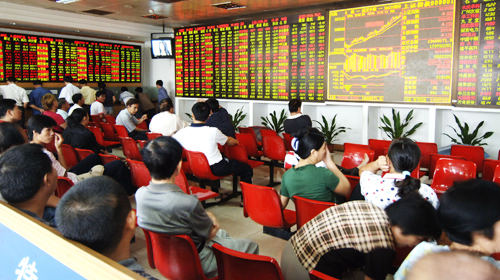|
 |
|
SECURITIES BOOM: Investors trade shares at the Shanghai Stock Exchange. Fast development of the securities markets has helped China's listed firms improve corporate governance and market operations (ZHAO YING) |
Business vitality has also been stimulated by transforming inefficient state-owned enterprises (SOEs) into share-holding companies. Data of the report showed 988 of the 1,293 large SOEs, or 77 percent, had been restructured into corporate enterprises with multiple shareholders by 2008.
Corporate governance was further improved through four major mechanisms: board of directors, executive compensation, ownership structure and financial transparency. In 2008, among the 988 restructured large SOEs, 91.52 percent had established shareholders' meetings, 95.34 percent set up a board of directors and 80.87 percent had the board of supervisors.
These reforms were accompanied by an unprecedented opening to the outside world in search of export markets and necessary foreign investments, technology and management know-how.
As part of China's WTO commitment, the country allowed foreign investors into a series of formerly state-controlled areas, such as finance, banking, insurance, securities and health care.
The society has become more fluid and dynamic than ever before, featuring greater social and geographical mobility and horizontal integration. Workers are gaining growing rights with respect to compensation and choice of employment. Newspapers are usually filled with reports that manufacturers in east coastal regions are finding it difficult to hire enough employees as workers demand higher salaries.
Zhuang Jian, chief China economist with the Asian Development Bank, said China has largely become a market economy with pricing of most products in the hands of the market.
"Since joining the WTO, the country has also drastically reduced import tariffs, liberalized foreign trade, while taking solid steps to tighten corporate laws, improve its investment environment and protect intellectual property rights (IPRs)," he said.
Xu Hongcai, an economist with the China Center for International Economic Exchanges, said Western countries should take account of China's accomplishments in market openness and should not give unreasonable criticism.
The discrimination would only deal a heavy blow to their trade with China, he added.
Despite the progress China has made in market-oriented reforms, it certainly has room for improvement.
"China's market reforms are still far from over," said Fan Gang, Director of the National Economic Research Institute. "To build a modern market economy, China still needs to further open up its financial industry, repair the social safety net, and establish the rule of law."
"Learning lessons from the 2008 financial crisis, China should also strengthen market supervision and macroeconomic controls to avoid market imbalance," he added.
"The country should make stiff efforts to deepen reform in a series of state-monopolized sectors like energy and telecommunications and foster fair competition," said Zhuang.
Efforts are in fact already underway. For example, the government in early 2009 decided to adjust retail fuel prices when world crude oil prices changed by more than 4 percent over 22 straight working days. This was a remarkable break from a more or less rigid pricing scheme to which the government makes irregular and infrequent changes.
| 